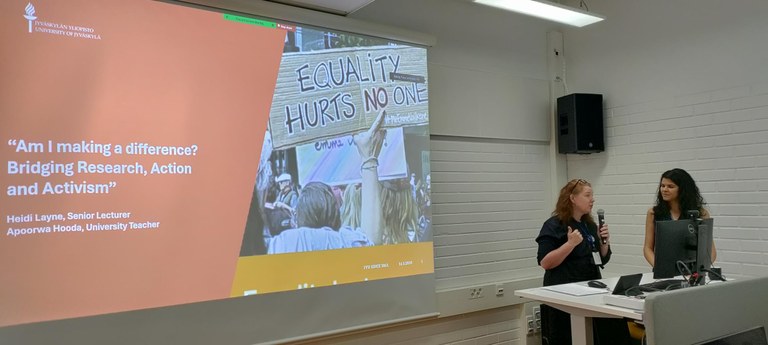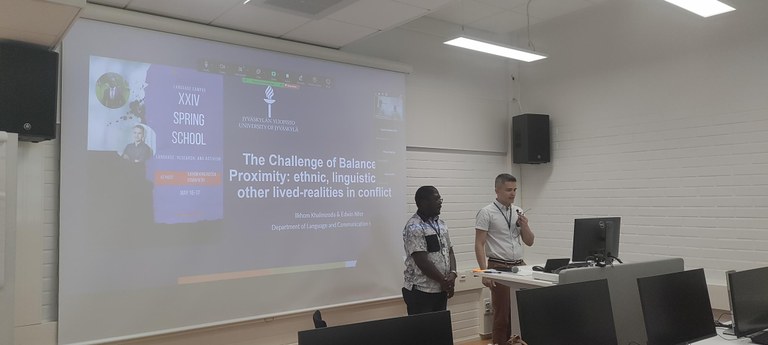Spring School 2024: Language, research and activism
Writers: Emilia Rajala and Laura Castañe Bassa
Spring School XXVI gathered doctoral researchers around the topic of “Language, research, and activism” with keynotes and presentations on the doctoral researchers’ work. This year Spring School was arranged in a hybrid form so participants from abroad were able to join on the sessions as well. Spring Schools are traditionally organized by and for doctoral researchers of the Language Campus, and the idea is to provide a site to present even early stage research, get feedback on it and make new connections with other doctoral researchers. A key priority was inclusivity and accessibility. The conference was an inclusive, multicultural, multilingual, multimodal and accessible event, with interpreting services from Finnish Sign Language to spoken English by professional interpreters to ensure that participants of all linguistic backgrounds could actively engage in discussions.
Thursday May 16
On Thursday May 16, Spring School was opened with a keynote “Am I making a difference? Bridging research, action and activism” by Apoorwa Hooda, University teacher, and Heidi Layne, Senior Lecturer, followed by a discussion session. Hooda and Layne argued that action or activism is important to discuss in connection to research, as it allows the scholars a possibility to connect with people outside academia in addition to there being a shortage of action-oriented research. Hooda and Layne introduced the concept of Participatory Action Research (PAR) which is “driven by interest in tackling injustices and building futures supportive of human thriving, rather than objectivity and neutrality” and can be used with different research methods. The keynote was then followed by discussion on broadening the ideas of connections between research and activism. The doctoral researchers got to reflect on questions of i.e. their audience and ethical considerations and risks involved in action research and activism.

Picture 1. Heidi Layne and Apoorwa Hooda presenting the first keynote.
After lunch break, the event continued with three presentations by doctoral researchers on their work followed by discussions with a senior researcher and the audience. Viktoriia Kareva started this session with a presentation on “Responsive mediation in in-service teacher conceptual development”. She caught audience’s attention with the use of pictures as tools for thinking during the interviews she conducted with one in-service teacher. The second one to present was Tatiana Rasskazova who shared her research on assessment, mediation and learning. She captivated the audience from the beginning when she used the concept of dancing to explain what was dynamic and static assessment. Last but not least, Mélodine Sommier shared her experience and reflections on the series of “show your Rotterdam”workshops she had recently conducted. The audience had the chance to learn about the whole pre and post process of the workshops. The day ended with a coffee break during which organisers and some participants reflected on the success of the first day and various research topics.
Friday May 17
The second day started with three more presentations. The first presentation of the day was given by Paula Mattila who presented about knowledge of internationalisation in the Finnish core curriculum using the approach epistemic givernance, a new concept for many of the participants. Next, Taina Järvenppää presented about the change of content and meaning in the public discussion of church and marital law. Her presentation sparkled a deep discussion about the role and power of church in Finland and the Nordic countries. Laura Castañe Bassa ended this session with a presentation about an empirical exploration of language practices, ideologies and pedagogical approaches in a Catalan primary school. The audience was curious to know more about the Catalonia’s context and her positionality as a local in her research context. After three inspiring presentations, a refreshing lunch unfolded, paving the way for captivating conversations to blossom.
The event continued with the second keynote “The challenge of balance in proximity: ethnic, linguistic and other lived-realities in conflict” given by Ilkhom Khalimzoda, postdoctoral researcher, and Edwin Nfor, doctoral researcher. Nfor presented his research on political crisis reporting in an era of media interdependence and shed light on the challenges of proximity to the topic: subjectivity vs. objectivity, ethical considerations, establishing trust and rapport in addition to navigating community expectations and pressure. The balance in proximity can be maintained i.e. with careful approach, clear ethical protocols and practising reflexivity. Khalimzoda discussed his research of social media crossroads and navigating the Russia-west divide. The difficulties that he shared are of finding untapped areas while being aware of the implications of your research, risk of being marginalized or politicized and the possibility of your research being exploited. For activism, Khalimzoda shared takeaways of reducing polarization, balancing the proximity to the topic, shaping the reality positively and learning to stay away from the research.

Picture 2. Ilkhom Khalimzoda and Edwin Nfor presenting the second keynote.
The second keynote concluded the Spring School for 2024 and the organizing team thanks all the participants, keynote speakers, presenters and discussants. Despite the short number of participants this year, the event ended up being very fruitful. Through the feedback form, participants commented that it was such an opportunity to collaborate and communicate with other researchers from different spheres and they really enjoyed the keynote presentations and discussions.
Big thank you to all the organisers and participants!
See you next spring for the next Spring School!